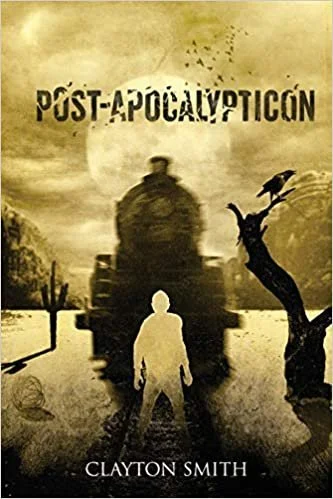Book Review: Post-Apocalypticon
Post-Apocalypticon. Clayton Smith. Dapper Press, October 24, 2018, Trade Paperback and E-book, 269 Pages.
Reviewed by Jose Nateras.
In “The Apocalypticon Trilogy,” Clayton Smith has crafted a world readers will find both familiar and drastically changed by the events of the apocalypse.
The trilogy’s first installment, Apocalypticon, centers on best friends Patrick Deen and Ben Fogelvee. Doing their utmost to survive in post-apocalypse Chicago, the two set off on a cross country road trip to Disney World that quickly goes south. Throughout his character’s tragi-comic, nail-biting quest, Smith somehow manages to fuse the bleak landscape of works like Cormac McCarthy’s Blood Meridian, with the lighter zom-com fare of movies like Zombieland, creating a world as brutal as it is funny; a world more than worthy of a return visit to this, the next entry in the series.
In Post-Apocalypticon, the second book in the trilogy, Smith picks up not long after the events of Apocalypticon. Ben has taken over the training of the Red Caps—the security forces for the post-apocalyptic-wasteland-reinforced train that is conducted by returning character, Horace. In the first years after the apocalypse, Horace’s train safely transported valuables between the few monied survivors still willing to pay to transport goods from place to place. Now, among the goods that Ben and his bumbling trainees are safekeeping is something particularly valuable indeed—a sealed case with contents that could change the world. When Ben’s advice goes unheeded and the train ends up snared in a less-than-subtle trap, Ben finds himself launched on yet another danger-filled adventure across a wasteland full of bandits and other baddies, setting the stage for the forthcoming conclusion to the trilogy.
Throughout Post-Apocalypticon, Smith makes the task of maneuvering through drastic tone-shifts look easy. Going from laugh-out-loud snark, to wince-inducing gore and violence can be tricky. Yet Smith manages to consistently tap into the black-humor and a jaded-by-the-end-of-the-world inspired snark that allows for any tonal-whiplash to feel fun. He takes his readers on a rollercoaster ride that can make an anecdote about accidentally killing your buddy with a machete into a running joke, highlighting the need to train new Red Caps with nothing but pool noodles for battle prep. Keeping that in mind, Smith’s ability to consistently evoke glimmers of humanity and pain amidst all the violence and laughs is quite impressive. His dialogue is sharp-witted and stylized in the vein of Joss Whedon; his characters as jagged and broken as you’d expect of survivors of the apocalypse. Yet jagged and broken or not, they haven’t lost their sense of humor, making it impossible for readers not to root for Ben Fogelvee as he journeys across the post-apocalyptic desert.
Post-Apocalypticon is a worthy second installment in a trilogy fans will surely be chomping at the bit to see completed. Genre enthusiasts are sure to get a kick out of Smith’s use of familiar motifs from the realm of end-of-the-world fiction, just as they are sure to be entertained by the fun that is far less common to a sub-genre known for its typically dour tone.

